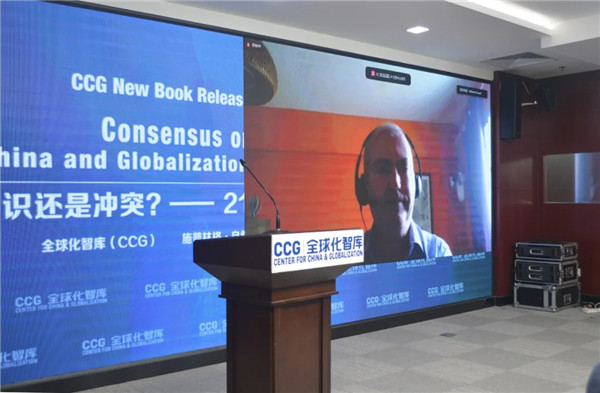William Achauer:CCG’s new book enhances global communication
October 11 , 2021
William Achauer, Business, Editorial Director for Economics, Political Science and Law, Springer Nature Group
On October 11, the Center for China and Globalization (CCG) and Springer jointly launched the book, Consensus or Conflict? – China and Globalization in the 21st century, a book focusing on tackling with global challenges and promoting global governance, for the first time in the world.
Below is William Achauer’s address for the book launch:
Greetings everyone. My name is William Achauer, I’m Editorial Director for business, economics and politics book publishing at Springer Nature. I’m based in Singapore, and I lead a team of publishing editors across the Asia-Pacific region, including China.
We are thrilled to celebrate with you all today the launch of the volume “Consensus or Conflict? – China and Globalization in the 21st Century”, which is edited by Wang Huiyao and Alistair Michie. The book is part of our Springer series “China and Globalization” which has been conceived in partnership with the Center for China and Globalization (CCG).
“Consensus or Conflict?” has been published open access which means that the complete 400 page volume and its 36 contributions, including the Preface by the volume editors, is freely available to anyone across the globe with an internet connection and a keen interest in reading leading academic and professional perspectives on perhaps the most single important issue the global community faces: the sustainable future of our relationships across the world, how a long-established superpower and a quickly emerging one forge a positive relationship to cooperate with essential support across the entire developed and developing world, with a common mission to take on the real threats that we, as a global community, face in this third decade of the 21st century. Two of the most central threats, which are covered extensively in the chapters of this edited volume, are 1) building a truly global coalition to save the planet and to combat the menace of climate change, and 2) to develop and execute effective and smart public health measures to end the current pandemic and to prevent further ones, or at least, to be able to manage further ones smartly, if they do occur, so that lives and livelihoods are saved across the globe for a sustainable world economy.
I’d like to express my gratitude, as well as my congratulations, to Wang Huiyao and Alistair Michie for their achievement in putting this remarkable book together. They’ve brought together a dream team of top-notch scholars and professionals across the planet to share their knowledge and experience in this volume.
Drawing upon what the volume editors refer to as “the spirit and core culture of CCG”, they set the scene for the book by stating, “we believe that a globalized world is a core component for the creation of a peaceful and sustainable world order that contributes to the mutual benefit of all mankind.” They make a crucial point that back in the 1950s, over 90% of the global middle class resided in Europe and North America. Today, over 20% live in China. Additionally, they estimate that 1.2 billion Chinese will be in the middle class by 2027, making up one quarter of the world total.
Reflecting a bit on chapters I’ve read in the book. Kerry Brown, Professor of Chinese Studies and Director of the Lau China Institute, Kings College in London, takes these issues head on in his contributed chapter. He acknowledges that China, unlike the Soviet Union, is not only a communist superpower but also one that is, “a supremely successful practitioner of capitalism”. He later reminds us all that China is, “multiple things – capitalist and communist, old (as a culture) and new (as a state), Confucian and Marxist”. Both volume editors, Wang Huiyao and Alistair Michie, make a central point in their chapters that China, as an ancient civilization that still exists today, can “propose its own solutions to global issues”, as Wang Huiyao points out. Alistair Michie stresses in the section of his chapter entitled “Our World is in a Communication Crisis” that he learned almost nothing about China at school or university, and it wasn’t until 1989 when Chinese friends in Malaysia awoke his curiosity.
Joseph Nye, University Distinguished Service Professor, Emeritus and Former Dean of Harvard’s Kennedy School of Government, explores in his contribution “China and the US: Looking forward Forty Years” what the future holds now that we are in the fourth phase of China-US relations since the end of the Second World War. Professor Nye’s conclusion is that a “cooperative rivalry” is necessary and that neither part of that concept can be lost, ignored, or forgotten. He strikes a hopeful balance in that he writes, “In my view, economic and ecological interdependence reduce the probability of a Cold War and give the two countries an incentive to cooperate and build institutions in a number of areas”.
There are abundant, terrific contributions in this book that I’d love to further reflect upon, but I do need to keep this speech brief and stop here.
In closing, I briefly want to stress again the fact that this is an open access book. As I began to prepare for this speech, I noticed that the book only published on our platform SpringerLink just a few days ago. This was just last week. One day last week, I noticed there were 5,000 chapter downloads, the next day it jumped up to 5,900 chapter downloads, the next day it had reached 9,000 chapter downloads, and then the next day 15,000! Then, yesterday, I noticed it had reached 25,000 chapter downloads! This is what we refer to as the “OA Effect” (the open access effect) when the discovery cycle takes on a life of its own.
Thank you all for the opportunity to speak today! The release of this book is worthy of a terrific celebration!
[Book Introduction Video]
Download Book at Springer
https://link.springer.com/book/10.1007/978-981-16-5391-9
Browser, Download & Buy Book at Amazon.com:
https://www.amazon.com
Topical News See more






